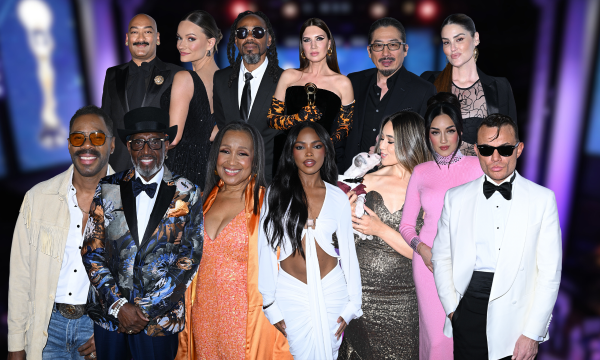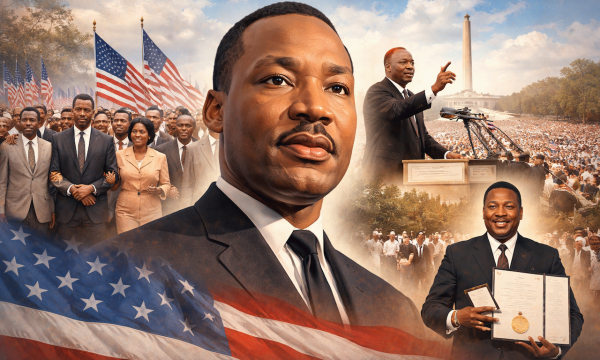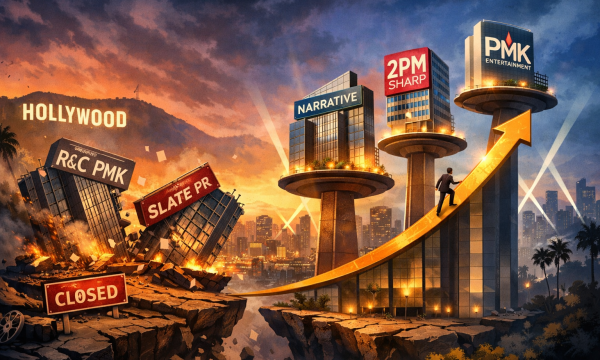
Are you a movie lover? TCM‘s 15 week movie event “The Story of Film: An Odyssey” will literally blow your mind.
Encompassing every era of cinema (from the Lumiere brothers to Quentin Tarantino) the schedule is, for a lack of a better word, impressive. Take a look below. Note, all times are EST.
Monday, Sept. 2
8 p.m. – Films from Edison Studios (U.S.A.)
9:30 p.m. – Films from the Lumière Brothers (France)
10 p.m. – The Story of Film: An Odyssey (2011) – Episode One: “Birth of the Cinema (1900-1920)” –The Story of Film: An Odyssey opens with the birth of a great new art form, the movies. Filmed in the very buildings where the first movies were made, it shows that ideas and passion have always driven film, more than money and marketing. This opening installment tells the story of the very first movie stars, close-ups and special effects. It also explores how Hollywood became a myth. The story is full of surprises, such as the fact that the greatest and best-paid writers in these early years were women. It’s also full of glamour, as epitomized by great movie cathedrals.
11:15 p.m. – A Trip to the Moon (1902) (France)
11:30 p.m. – Alice Guy-Blaché Shorts (U.S.A.): Falling Leaves (1912), Canned Harmony (1912), A House Divided (1913)
12:30 a.m. – The Squaw Man (1914) (U.S.A.)
2 a.m. – The Birth of a Nation (1915) (U.S.A.)
5:15 a.m. – Orphans of the Storm (1921) (U.S.A.)
Tuesday, Sept. 3
8 p.m. – Intolerance (1916) (U.S.A.)
11:30 p.m. – Way Down East (1920) (U.S.A.)
2 a.m. – Haxan (1922) (Sweden, Denmark)
4 a.m. – The Story of Film: An Odyssey (2011) – Episode One: “Birth of the Cinema (1900-1920)”
5:15 a.m. – The Phantom Carriage (1922) (Sweden)
7:15 a.m. – The Wind (1928) (U.S.A.)
Monday, Sept. 9
8 p.m. – One Week (1920) (U.S.A.)
8:30 p.m. – The Three Ages (1923) (U.S.A.)
10 p.m. – The Story of Film: An Odyssey (2011) – Episode Two: “The Hollywood Dream (1920s)” – This is the fascinating story of the movies in the roaring ’20s, when Hollywood became a glittering entertainment capital and star directors like Charlie Chaplin and Buster Keaton emerged. But the gloss and fantasy was challenged by movie makers like Robert Flaherty, Eric Von Stroheim and Carl Theodor Dreyer, who wanted films to be more serious and mature. Filmed in Hollywood, Denmark and Moscow, this part looks at the battle over the soul of cinema and some of the greatest movies ever made.
11:15 p.m. – The General (1927) (U.S.A.)
12:45 a.m. – The Kid (1921) (U.S.A.)
1:45 a.m. – City Lights (1931) (U.S.A.)
3:30 a.m. – Never Weaken (1921) (U.S.A.)
4:15 a.m. – Safety Last (1923) (U.S.A.)
Tuesday, Sept. 10
8 p.m. – Nanook of the North (1922) (U.S.A.)
9:15 p.m. – The Thief of Bagdad (1924) (U.S.A.)
11:15 p.m. – The Passion of Joan of Arc (1928) (France)
1:15 a.m. – The Crowd (1928) (U.S.A.)
3:15 a.m. – The Story of Film: An Odyssey (2011) – Episode Two: “The Hollywood Dream (1920s)”
4:30 a.m. – Greed (1924) (original release version) (U.S.A.)
6:45 a.m. – Vampyr (1932) (Germany)
Monday, Sept. 16
8 p.m. – Sunrise: A Song of Two Humans (1927) (U.S.A.)
10 p.m. – The Story of Film: An Odyssey (2011) – Episode Three: “Expressionism, Impressionism and Surrealism: Golden Age of World Cinema (1920s)” – The 1920s were a Golden Age in world cinema. In Paris, Berlin, Moscow, Shanghai and Tokyo, movie makers were pushing the boundaries of the medium. German Expressionism, Soviet montage, French impressionism and surrealism were passionate new film movements, but less well known are the glories of Chinese and Japanese films and the moving story of one of the greatest movie stars of all time, the all-but-forgotten Ruan Lingyu.
11:15 p.m. – Battleship Potemkin (1925) (Soviet Union)
12:45 a.m. – The Goddess (1934) (China)
2:15 a.m. – The Cabinet of Dr. Caligari (1920) (Germany)
3:30 a.m. – Metropolis (1927) (Germany)
Tuesday, Sept. 17
8 p.m. – La Roue (1923) (France)
12:30 a.m. – Un Chien Andalou (1928) (France)
1 a.m. – I Was Born, But… (1932) (Japan)
3 a.m. – The Story of Film: An Odyssey (2011) – Episode Three: “Expressionism, Impressionism and Surrealism: Golden Age of World Cinema (1920s)”
4:15 a.m. – Osaka Elegy (1936) (Japan)
Monday, Sept. 23
8 p.m. – Love Me Tonight (1932) (U.S.A.)
10 p.m. – The Story of Film: An Odyssey (2011) – Episode Four: “The Arrival of Sound (1930s)” – The coming of sound in the 1930s upended nearly everything that had gone before, giving rise to new genres like the screwball comedy, gangster picture and musicals, and fertile ground for Howard Hawks, who managed to master all of them. The decade climaxed in 1939 with Hollywood delivering some of the greatest films of all time, three of which – The Wizard of Oz, Gone with the Wind and Ninotchka – also have something else in common. Meanwhile, far from Hollywood, Alfred Hitchcock hit his stride in England, and French directors became masters of mood.
11:15 p.m. – The Public Enemy (1931) (U.S.A.)
12:45 a.m. – Frankenstein (1931) (U.S.A.)
2 a.m. – Gold Diggers of 1933 (1933) (U.S.A.)
3:45 a.m. – Twentieth Century (1934) (U.S.A.)
5:30 a.m. – The Adventures of Prince Achmed (1927) (Germany)
Tuesday, Sept. 24
8 p.m. – Zero de Conduite (1933) (France)
9 p.m. – L’Atalante (1934) (France)
10:45 p.m. – Grand Illusion (1937) (France)
12:45 a.m. – Rules of the Game (1939) (France)
2:45 a.m. – The Story of Film: An Odyssey (2011) – Episode Four: “The Arrival of Sound (1930s)”
4 a.m. – Le Quai de Brumes (1939) (France)
Monday, Sept. 30
8 p.m. – Stagecoach (1939) (U.S.A.)
10 p.m. – The Story of Film: An Odyssey (2011) – Episode Five: “Post-War Cinema (1940s)” – This part of The Story of Film shows how the trauma of war made cinema more daring. The story starts in Italy, and then we go to Hollywood, discover Orson Welles and chart the darkening of American film and the drama of the McCarthy era. Screenwriters Paul Schrader and Robert Towne discuss their work during this time. Singin’ in the Rain co-director Stanley Donen talks about his career, and we discover that British films like The Third Man best sum up these extraordinary years.
11:15 p.m. – Citizen Kane (1941) (U.S.A.)
1:30 a.m. – The Best Years of Our Lives (1946) (U.S.A.)
4:30 a.m. – Rome, Open City (1946) (Italy)
Tuesday, Oct. 1
8 p.m. – Singin’ in the Rain (1952) (U.S.A.)
10 p.m. – Double Indemnity (1944) (U.S.A.)
Midnight – The Bicycle Thieves (1948) (Italy)
1:45 a.m. – Gun Crazy (1950) (U.S.A.)
3:15 a.m. – The Story of Film: An Odyssey (2011) – Episode Five: “Post-War Cinema (1940s)”
4:30 a.m. – The Big Sleep (1946) (U.S.A.)
6:30 a.m. – A Matter of Life and Death (1947) (United Kingdom)
Monday, Oct. 7
8 p.m. – Pather Panchali (1955) (India)
10 p.m. – The Story of Film: An Odyssey (2011) – Episode Six: “Sex & Melodrama (1950s)” – This is the story of sex and melodrama in the movies of the 1950s. While James Dean, On the Waterfront and the glossy weepies of the time kept American audiences enraptured, Egypt, India, China, Mexico, Britain and Japan were making their own movies full of rage and passion. This episode features interviews with many people who worked with Satyajit Ray; legendary actress Kyoko Kagawa, who starred in films by Akira Kurosawa and Yasujiro Ozu; and the first great African director, Youssef Chahine.
11:15 p.m. – Cairo Station (1958) (Egypt)
12:45 a.m. – Throne of Blood (1957) (Japan)
2:45 a.m. – Seven Samurai (1954) (Japan)
Tuesday, Oct. 8
8 p.m. – Rebel Without a Cause (1955) (U.S.A.)
10 p.m. – All that Heaven Allows (1955) (U.S.A.)
11:45 p.m. – Johnny Guitar (1954) (U.S.A.)
1:45 a.m. – The Story of Film: An Odyssey (2011) – Episode Six: “Sex & Melodrama (1950s)”
3 a.m. – Los Olvidados (1950) (Mexico)
4:30 a.m. – …And God Created Woman (1956) (France)
Monday, Oct. 14
8 p.m. – Nights of Cabiria (1957) (Italy)
10 p.m. – The Story of Film: An Odyssey (2011) – Episode Seven: “European New Wave (1960s)” – This is the explosive story of film in the late ’50s and ’60s. Claudia Cardinale talks about working with Federico Fellini. In Denmark, Lars Von Trier describes his admiration for Ingmar Bergman. And Bernardo Bertolucci remembers his work with Pier Paolo Pasolini. Meanwhile, French filmmakers gave birth to a new wave that began to sweep across Europe.
11:15 p.m. – Winter Light (1962) (Sweden)
12:45 a.m. – Pickpocket (1959) (France)
2:15 a.m. – Cleo from 5 to 7 (1962) (France, Italy)
3:45 a.m. – The 400 Blows (1959) (France)
5:30 a.m. – Rocco and His Brothers (1960) (Italy, France)
Tuesday, Oct. 15
8 p.m. – A Fistful of Dollars (1964) (U.S.A.)
9:45 p.m. – Accatone (1968) (Italy)
Midnight – Breathless (1960) (France)
1:45 a.m. – I Am Curious (Yellow) (1967) (Sweden)
4 a.m. – The Story of Film: An Odyssey (2011) – Episode Seven: “European New Wave (1960s)”
5:15 a.m. – L’Eclisse (1962) (Italy, France)
Monday, Oct. 21
8 p.m. – Boy (1969) (Japan)
10 p.m. – Knife in the Water (1962) (Poland)
Midnight – The Story of Film: An Odyssey (2011) – “Episode Eight: “New Directors, New Form (1960s)” – This is the story of the dazzling world cinema of the 1960s. Easy Rider and 2001: A Space Odyssey began a new era in America cinema. Documentary influenced mainstream movies, as legendary cinematographer Haskell Wexler explains. Cinema’s new wave continued to sweep around the world, giving rise to new voices like Roman Polanski, Andrei Tarkovsky and Nagisa Oshima and a new black cinema from Africa. This episode also features an interview with master Indian director Mani Kaul.
1:15 a.m. – Daisies (1966) (Czechoslovakia)
2:45 a.m. – Andrei Rublev (1966) (Soviet Union)
6:15 a.m. – Ashes and Diamonds (1958) (Poland)
Tuesday, Oct. 22
8 p.m. – Saturday Night and Sunday Morning (1961) (United Kingdom)
10 p.m. – The Insect Woman (1963) (Japan)
12:15 a.m. – The House is Black (1963) (Iran)
12:45 a.m. – I Am Cuba (1964) (Cuba, Soviet Union)
3:15 a.m. – The Story of Film: An Odyssey (2011) – “Episode Eight: “New Directors, New Form (1960s)”
4:30 a.m. – Black Girl (1966) (Senegal, France)
Monday, Oct. 28
8 p.m. – The Graduate (1967) (U.S.A.)
10 p.m. – The Story of Film: An Odyssey (2011) – Episode Nine: “American Cinema of the ’70s” – This is the remarkable story of the maturing of American cinema of the late ’60s and ’70s. Buck Henry, who wrote The Graduate, talks about movie satire of the time. Paul Schrader reveals his thoughts on his existential screenplay for Taxi Driver. Writer Robert Towne explores the dark ideas in Chinatown. And director Charles Burnett talks about the birth of black American cinema.
11:15 p.m. – McCabe & Mrs. Miller (1971) (U.S.A.)
1:30 a.m. – The Last Picture Show (1971) (U.S.A.)
3:45 a.m. – Mean Streets (1973) (U.S.A.)
Tuesday, Oct. 29
8 p.m. – Badlands (1973) (U.S.A.)
9:45 p.m. – Cabaret (1972) (U.S.A.)
Midnight – M*A*S*H (1970) (U.S.A.)
2 a.m. – Chinatown (1974) (U.S.A.)
4:15 a.m. – The Story of Film: An Odyssey (2011) – Episode Nine: “American Cinema of the ’70s”
5:30 a.m. – Killer of Sheep (1977) (U.S.A.)
Monday, Nov. 4
8 p.m. – My Brilliant Career (1979) (Australia)
10:15 p.m. – Picnic at Hanging Rock (1975) (Australia)
12:15 a.m. – Alice in the Cities (1974) (Germany)
2:15 a.m. – The Story of Film: An Odyssey (2011) – Episode 10: “Movies to Change the World (1970s)” – This is the story of the movies that set out to change the world in the 1970s. England, Germany and Italy were at the center of this new style. Meanwhile, Japan was making some of the world’s most moving films, Australian was giving birth to its own cinema. Even bigger, bolder questions about film were being asked in Africa and South America. And John Lennon discovered what would become his favorite film, the extraordinary, psychedelic The Holy Mountain. Interviews include German filmmaker Wim Wenders and British filmmaker Ken Loach.
3:30 a.m. – Xala (1975) (Senegal)
5:45 a.m. – The Battle of Chile, Part One (1975) (Venezuela, France, Cuba)
7:30 a.m. – The Battle of Chile, Part Two (1976) (Venezuela, France, Cuba)
Monday, Nov. 11
8 p.m. – Jaws (1975) (U.S.A.)
10:15 p.m. – Zanjeer (1973) (India)
12:45 a.m. – Enter the Dragon (1973) (Hong Kong, U.S.A.)
2:30 a.m. – The Story of Film: An Odyssey (2011) – Episode 11: “The Arrival of Multiplexes and Asian Mainstream (1970s)” – Star Wars, Jaws and The Exorcist created the multiplexes, but they were also innovative as works of art. In India, Bollywood was doing new things in the ’70s, as the world’s most famous movie star, Amitabh Bachchan, explains. And Bruce Lee movies in Hong Kong were kick-starting the kinetic films of Hong Kong, setting the stage for martial arts master Yuen Wo Ping’s extraordinary wire fu choreography for The Matrix decades later.
3:45 a.m. – The Message (1976) (Lebanon, Libya, Kuwait, Morocco, United Kingdom)
Monday, Nov. 18
8 p.m. – Gregory’s Girl (1981) (United Kingdom)
10 p.m. – The Elephant Man (1980) (U.S.A.)
12:15 a.m. – Yeelen (1987) (Mali, Burkina Faso, France, West Germany, Japan)
2:15 a.m. – The Story of Film: An Odyssey (2011) – Episode 12: “Fight the Power: Protest in Film (1980s)” – With Ronald Reagan in the White House and Margaret Thatcher in Downing Street, the 1980s were the years of protest in the movies, when brave filmmakers spoke truth to power. It also marked the rise of independent cinema in America, as director John Sayles explains. In Beijing, Chinese cinema blossomed in the years before the Tiananmen crackdown. In the Soviet Union, the past welled up in astonishing films. And in Poland, the master director Krzysztof Kieslowski emerged.
3:30 a.m. – Repentance (1984) (Soviet Union)
Monday, Nov. 25
8 p.m. – Days of Being Wild (1990) (Hong Kong)
10 p.m. – Where is the Friend’s Home? (1987) (Iran)
Midnight – Beau Travail (1999) (France)
2 a.m. – The Story of Film: An Odyssey (2011) – Episode 13: “New Boundaries: World Cinema in Africa-Asia, Latin America (1990s)” – Few saw it coming, but cinema around the world in the 1990s entered a new Golden Age. In Iran, Abbas Kiarostami rethought the art of film and made it more real. Shinya Tsukamoto paved the way for the bold new Japanese horror cinema. Mexico’s cinema began to blossom with new films and filmmakers. Interviews include acclaimed director Claire Denis.
3:15 a.m. – Funny Games (1997) (Austria)
5 a.m. – Touki Bouki (1973) (Senegal)
Monday, Dec. 2
8 p.m. – The Hudsucker Proxy (1994) (U.S.A.)
10 p.m. – Gladiator (2000) (U.S.A.)
12:45 a.m. – The Story of Film: An Odyssey (2011) – Episode 14: “New American Independents & The Digital Revolution (1990s)” – This the story of the brilliant, flashy, playful movies in the English-speaking world in the ’90s, when Quentin Tarantino took began taking dialogue to a new level while the Coen Brothers served up off-kilter movies with an edge. Sci-fi epics like Starship Troopers and Robocop were packed with irony. In Australia, Baz Luhrmann was bringing a new showmanship to the movies with his “Velvet Curtain Trilogy,” including Romeo + Juliet and Moulin Rouge. But it was emergence of digital technology that changed the movies forever.
2 a.m. – The Piano (1993) (New Zealand, France)
4:15 a.m. – Reservoir Dogs (1992) (U.S.A.)
Monday, Dec. 9
8 p.m. – Etre e avoir (2002) (France)
10 p.m. – Russian Ark (2002) (Russia, Germany, Canada, Finland)
Midnight – Climates (2006) (Turkey)
2 a.m. – The Story of Film: An Odyssey (2011) – Episode 15: “Cinema Today and the Future (2000s)” – In the final part of The Story of Film: An Odyssey, movies come full circle. Filmmakers and their movies got more serious in the wake of 9/11. Romanian movies came to the fore. David Lynch created one of the most complex dream films ever made in Mulholland Drive, while Christopher Nolan turned film into a game with Inception. And in Moscow, master director Alexander Sokurov was taking film in new directions. The Story of Film closes with a surprising look at the future of the movies.
3:15 a.m. – Memories of Murder (2003) (South Korea)














